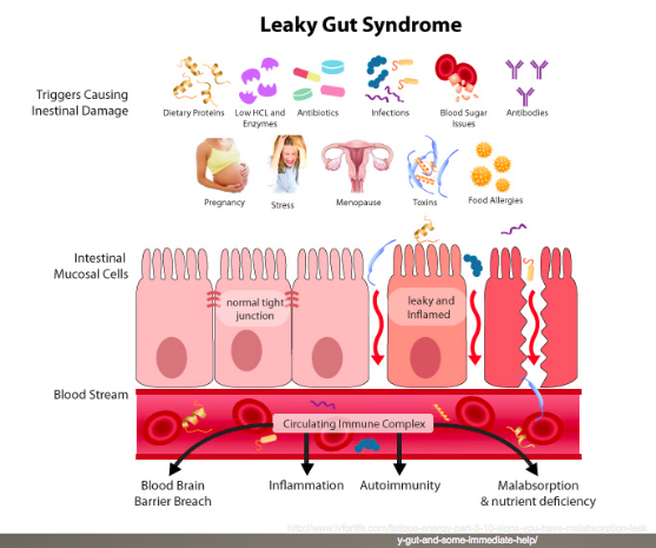Nova Wellness Center
Why is gut health important?
"All diseases start in the gut." – Hippocrates
A healthy gastrointestinal system is vital to addressing not only common digestive symptoms, but also to assist in treating immune, neurological, and inflammatory issues. Common digestive complaints such as heart burn and bowel movement irregularity are major warning signs that there is something underlying the symptoms. “Leaky Gut” is a term in functional medicine that is becoming more understood. A “Leaky Gut” means that the intestinal cells have become inflamed from triggers such as foods, low digestive enzymes, antibiotics, infections, blood sugar issues, stress, toxins, and medications. The inflamed intestinal cells do not allow for proper absorption of essential nutrients and also become poor barriers to things that should not enter the systemic tract and would normally be eliminated. “Leaky gut” has been associated with many conditions including autoimmune diseases, skin problems, irritable bowel syndrome, fibromyalgia, chronic fatigue, and heart disease.
Testing:
Treating Gastrointestinal Issues:
"All diseases start in the gut." – Hippocrates
A healthy gastrointestinal system is vital to addressing not only common digestive symptoms, but also to assist in treating immune, neurological, and inflammatory issues. Common digestive complaints such as heart burn and bowel movement irregularity are major warning signs that there is something underlying the symptoms. “Leaky Gut” is a term in functional medicine that is becoming more understood. A “Leaky Gut” means that the intestinal cells have become inflamed from triggers such as foods, low digestive enzymes, antibiotics, infections, blood sugar issues, stress, toxins, and medications. The inflamed intestinal cells do not allow for proper absorption of essential nutrients and also become poor barriers to things that should not enter the systemic tract and would normally be eliminated. “Leaky gut” has been associated with many conditions including autoimmune diseases, skin problems, irritable bowel syndrome, fibromyalgia, chronic fatigue, and heart disease.
Testing:
- Food Reactivity and Allergy Testing
- ALCAT Food Sensitivity Testing- ALCAT is a blood test that can detect up to 200 different food sensitivities based on how your white blood cells react when exposed to these food antigens.
- If food sensitivities are detected it is recommended that those foods be removed from the diet for a certain period of time. Each ALCAT test result includes a individualized 4 -day rotational eating plan to help guide you in eating a variety of foods for your optimal health and healing.
- Vibrant Food Allergy, Food Sensitivity, and Food Protein Antibody Testing (Wheat, Egg, Dairy, Soy, Peanut, Corn)
- ALCAT Food Sensitivity Testing- ALCAT is a blood test that can detect up to 200 different food sensitivities based on how your white blood cells react when exposed to these food antigens.
- Comprehensive Stool Testing
- Diagnostic Solutions GI- MAP – Evaluates digestion and absorption of proteins and fats, detects deficiencies in digestive enzymes, and evaluates a person’s microbiome to see if the there is a presence of healthy or harmful gut flora.
- Gut Permeability Testing ("Leaky Gut")- Leaky gut, or "intestinal permeability," is a condition in which the lining of the small intestine becomes damaged, causing undigested food particles, toxic waste products and bacteria to "leak" through the intestines and flood the blood stream. The foreign substances entering the blood can cause an autoimmune response in the body including inflammatory and allergic reactions such as migraines, irritable bowel, eczema, chronic fatigue, food allergies, rheumatoid arthritis and more.With leaky gut, damaged cells in your intestines don't produce the enzymes needed for proper digestion. As a result, your body cannot absorb essential nutrients, which can lead to hormone imbalances and a weakened immune system.
- SIBO Breath Test- Evaluates for small intestinal bowel overgrowth (SIBO). Small intestinal bacterial overgrowth (SIBO) occurs when there is an abnormal increase in the overall bacterial population in the small intestine — particularly types of bacteria not commonly found in that part of the digestive tract. Signs and symptoms of SIBO often include: loss of appetite, abdominal pain, nausea, bloating, an uncomfortable feeling of fullness after eating, diarrhea, unintentional weight loss, malnutrition
Treating Gastrointestinal Issues:
- Address issues found on testing, such as food rotation diets, nutritional supplementation recommendations, and sometimes more aggressive treatments to correct problems with medications.
Nova Wellness Center is a welcomed alternative to the fast-paced, impersonal, conventional-medical setting. Each patient who visits our facility is treated as an individual. We schedule adequate time to discuss your health concerns and wellness goals with you. We offer many evaluation and treatment modalities that utilize a holistic approach to medicine.
Our mission is to serve as an antidote to conventional healthcare. We educate our patients to promote wellness, prevent disease and decrease the need for prescription medications.
For your convenience we offer online scheduling for most of our services.
Our mission is to serve as an antidote to conventional healthcare. We educate our patients to promote wellness, prevent disease and decrease the need for prescription medications.
For your convenience we offer online scheduling for most of our services.
Connect with Nova Wellness Center


